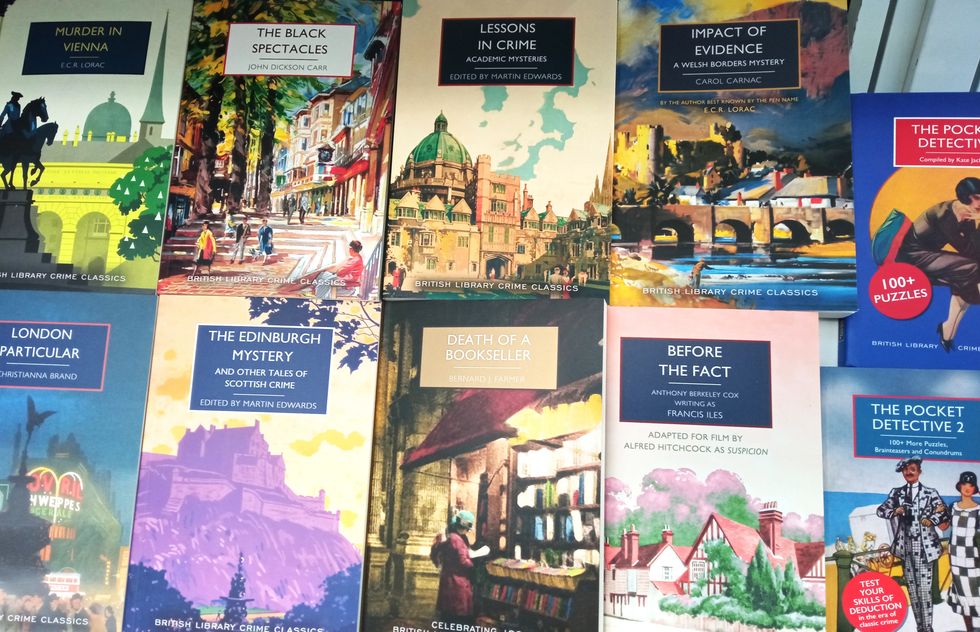THIS is a personal account of the London Book Fair 2025 at Kensington Olympia where I looked out last week for anything that might be of interest to Eastern Eye readers.
Every year I would have a chat with Pramod Kapoor, who founded the Indian publishing company, Roli Books, in 1978. But he no longer travels to London.
“Dad’s retired,” his son, Kapil Kapoor, tells me.
While Kapil manages the business side, his sister, Priya, focuses on the editorial at Roli Books.
“Roli Books will be celebrating its 50th anniversary in 2028,” Kapil points out.
Roli’s spread of books reflects the rich and diverse culture of India. He says books published by Roli are now available in the UK through Thames & Hudson.
As I glance through the Roli catalogue for 2024-2025, the book that immediately catches my attention is Iconic Trees of India by botanist S Natesh, with exquisite illustrations by Sagar Bhowmick.
“To understand trees is to understand life itself,” says the catalogue. “Iconic Trees of India is a celebration of the country’s (75) most remarkable trees that have stood witness to its vibrant history and become envoys of its culture. Complemented by original watercolours, the book details each legendary tree along with its historical and cultural importance.”
What you need for the London Book Fair is a strong cloth bag to carry back the collection of magazines and catalogues at the end of each day. I always pick up copies of The Bookseller, the industry bible.
It reports that Simon & Schuster have snapped up Morgue: Death, Tragedy and the Birth of True Crime in Nineteen Century Paris by Catriona Byers, “a historian’s look at a 19th century Paris morgue in which the unidentified dead were laid out for public view” in the hope the public might be able to recognise the deceased.
There are books on subjects I didn’t think even existed. There does not seem to be any limit to the human imagination, which is why every year I try and go on all three days of the London Book Fair. It took place from last Monday (10) to last Wednesday (12).
Since the introduction of a category last year for best history book in Eastern Eye’s Arts, Culture & Theatre Awards (ACTA) – the next one is on May 23, 2025 – I visited The History Press stall.
Last year it published The Great Epinal Escape: Indian Prisoners of War in German Hands by Ghee Bowman, described as “an explosive tale of courage, survival and the incredible 500 prisoners of war who escaped the clutches of the Nazis”.
By the late afternoon of the third day, people start to pack up as though it’s the end of the summer term at school. “Take any books you want,” said a friendly man at the stall promoting books from Ireland.
Iconic Trees of India by Roli Books
I took a catalogue, New Writing from Ireland – I am a great admirer, incidentally, of the author, Cauvery Madhavan, an Indian woman long settled in the republic – and a couple of books, The Irish Civil War: Law, Execution and Atrocity by Sean Enright and A June of Ordinary Murders by Conor Brady.
I also stopped by Michael O’Mara Books, not because of any Eastern Eye interest, but because its most successful author, Andrew Morton, who has written many bestsellers about the royal family, especially on the late Princess Diana, is an old friend of mine. He and I did several press trips with the Princess of Wales.
One of its books I might get is A Short History of the World in 50 Murders by Natasha Tidd – “from ancient Rome to the mid20th, this is a global exploration of the most heinous of crimes – murder”.
Of all the literary genres, crime fiction is by far the most popular, says the man with whom I have the most fascinating conversation of the week.
This is Jonathan Davidson, series editor of “Crime Classics” at the British Library.
It so happens this year we have a new ACTA category for best crime fiction.
It seems that deep in the dungeons of the British Library in St Pancras is an inexhaustible supply of largely forgotten crime thrillers published decades ago. Many are set in rural England in a society that was almost exclusively white. The British Library has published about 140 of them with more in the pipeline.
Davidson tells me: “There is certainly an appetite for some of that nostalgia and settings like rural villages or country houses. There is plenty of material. One of the challenges is deciding what to publish, because there’s so much we could be publishing in this series. Crime is a huge thing.
“The golden age of crime we’re often talking about in this series are the 1930s, 40s and 50s. There was a real boom in crime literature in the 1930s, especially, and that popularity led to many more authors getting into the genre and putting their own spin on it. And that continues all the way through to now, I suppose.”

Many novels he has brought back to life are from the 1920s and 1930s. The oldest, he reckons, is The Notting Hill Mystery by Charles Warren Adams, published in 1865.
I learn that the famous 1938 Hitchcock film, The Lady Vanishes, is based on a novel which first came out as The Wheel Spins by Ethel Lina White in 1936.
“The novel has occasionally been republished as The Lady Vanishes because of the popularity of the film, but we decided to publish it as the original, The Wheel Spins,” says Davidson.
One of his most popular authors is ECR Lorac (Carol backwards), a pseudonym for Edith Caroline Rivett (1894-1958), who also wrote under the names, Carol Carnac and Mary Le Bourne.
He explains why he especially likes Christianna Brand and John Dickson Carr: “The appeal of their writing is less about the nostalgia and the settings and more about the kind of intricacy of the puzzle and the way they play with the readers’ expectations, and even some of the comedy that still resonates well despite it being over 50 years old.”
He adds: “They may not have had the household name status of Agatha Christie, but they have been well known within the crime readership. They’re less a case of us saying we’ve found them, more a case of us saying they deserve to be reread by a modern audience.”
On display, for example, was Murder in Vienna by ECR Lorac (“Vienna was a hotbed of international intrigue”); Impact of Evidence by Carol Carnac; The Black Spectacles by John Dickson Carr; The Edinburgh Mystery and Lessons in Crime by Martin Edwards, who is also the “series consultant”.
The evocative covers are not commissioned paintings by artists, but often railway and other posters that Davidson locates. Permission also has to be sought from the estates or descendants of the authors before their books can be published. Sometimes that is detective work in itself.
Davidson emphasises that the Crime Classics are not for profit: “All the money goes direct back into delivering the library’s public services. That’s part of our mission. We try to get the word out there that purchasing the books that we produce is supporting the British Library, which is important.”




